7 Best Alternatives to Moodle for Corporate Training in 2025 (Ranked & Reviewed)
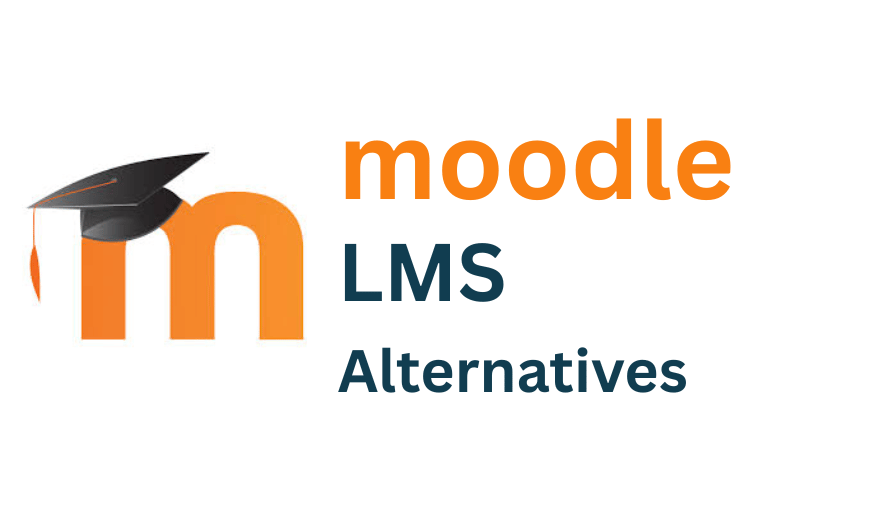
Introduction & Background
For years, Moodle has been a go-to open-source LMS for education and training. But when it comes to corporate learning, Moodle often falls short. Companies today demand:
a modern AI powered learning platform,
scalable integrations,
robust analytics,
faster deployment than Moodle’s complex setup, and
easy and cost effective on-going maintenance.
That’s why many organizations are actively searching for Moodle alternatives designed specifically for workforce and compliance training. Here are some disadvantages of using Moodle for Corporate training and compliance.
Disadvantages of using Moodle
Disadvantage | Explanation |
|---|---|
Complex Setup & Installation | Moodle requires technical expertise to install, configure, and maintain, often needing IT support. A medium size deployment of Moodle with custom themes, plugins, integrations may take 2 to 3 months. |
High Maintenance | Frequent updates, plugin management, and server upkeep make ongoing maintenance time-consuming. The maintenance cost of Moodle can often exceed its initial implementation cost, especially when factoring in updates, server management, and ongoing technical support. |
Not Mobile-First | While Moodle has a mobile app, it is not as intuitive or smooth as modern LMS platforms designed for mobile-first learning. |
Limited Built-In Analytics | Out-of-the-box reporting and analytics are basic, requiring plugins or customizations for detailed insights. |
Design & UI Limitations | Default themes and layouts feel dated; customization requires technical knowledge. |
Scalability Challenges | Large organizations may face performance issues without proper hosting infrastructure. |
Slow Deployment | Setting up courses and workflows can take weeks or months compared to modern SaaS LMS platforms. |
Support Constraints | Unlike commercial LMS platforms, Moodle’s support is community-driven unless you opt for paid third-party services, which can slow down problem resolution in a business environment. |
Moodle, though powerful, is not ideally suited for corporate training. Its interface is primarily designed for academic use, making it less intuitive for corporate learners, and customizing it for business needs can be time-consuming and technically complex. Out-of-the-box, it lacks key corporate features like compliance tracking, skill-based learning paths, and seamless HR system integrations. Additionally, ongoing maintenance and support can be costly and resource-intensive, making it less efficient for enterprise training environments.
In this guide, we’ll walk you through the top 7 alternatives to Moodle for corporate training in 2025. Each platform is compared on features, pros, cons, pricing, and ratings — to help you make the right choice.
1. Calibr (Our Top Pick)
Calibr is a modern, AI-powered Learning Management System built specifically for corporate and workforce training and is our top pick as a Moodle alternative. It offers drag-and-drop course creation, ready-to-use compliance templates, gamification, analytics dashboards, and seamless HR integrations. Designed for ease of use and rapid deployment, Calibr scales effortlessly from SMBs to large enterprises, making it a top choice over traditional LMS platforms like Moodle.
Best for: Companies that want a future-ready, AI-powered LMS for workforce training.
Key Features
AI-driven personalization for employees
Ready-to-use compliance & onboarding templates
Drag-and-drop course creation (SCORM, videos, docs)
Analytics dashboards for L&D and HR
Gamified learning (badges, leaderboards)
Integrations with HRMS.
Pros
Designed exclusively for corporate learning and compliance training
Extremely user-friendly compared to Moodle
Fast setup — cloud-based, no hosting hassles
Excellent customer support
Scales effortlessly from SMBs to 10,000+ employees
Cons
Newer in the market compared to legacy LMS platforms (but fast-growing)
Fewer third-party plugins than Moodle (offset by native integrations)
💰 Pricing
Starts at ₹75 per employee/month (scales with workforce size)
⭐ Rating
4.8 / 5 (G2, Capterra user feedback consolidated)
Why Calibr over Moodle?
Moodle was built for universities. Calibr is a AI-powered LMS built for modern businesses. Faster, lighter, and AI-powered — it helps companies launch training programs in days, not months.
2. TalentLMS
TalentLMS is good Moodle alternative. It is a cloud-based, user-friendly learning management system ideal for small to mid-sized businesses. It offers mobile-ready courses, SCORM and xAPI support, and easy course creation with custom branding. While simple to deploy and manage, it has limited advanced reporting and customization compared to enterprise-grade LMS platforms.
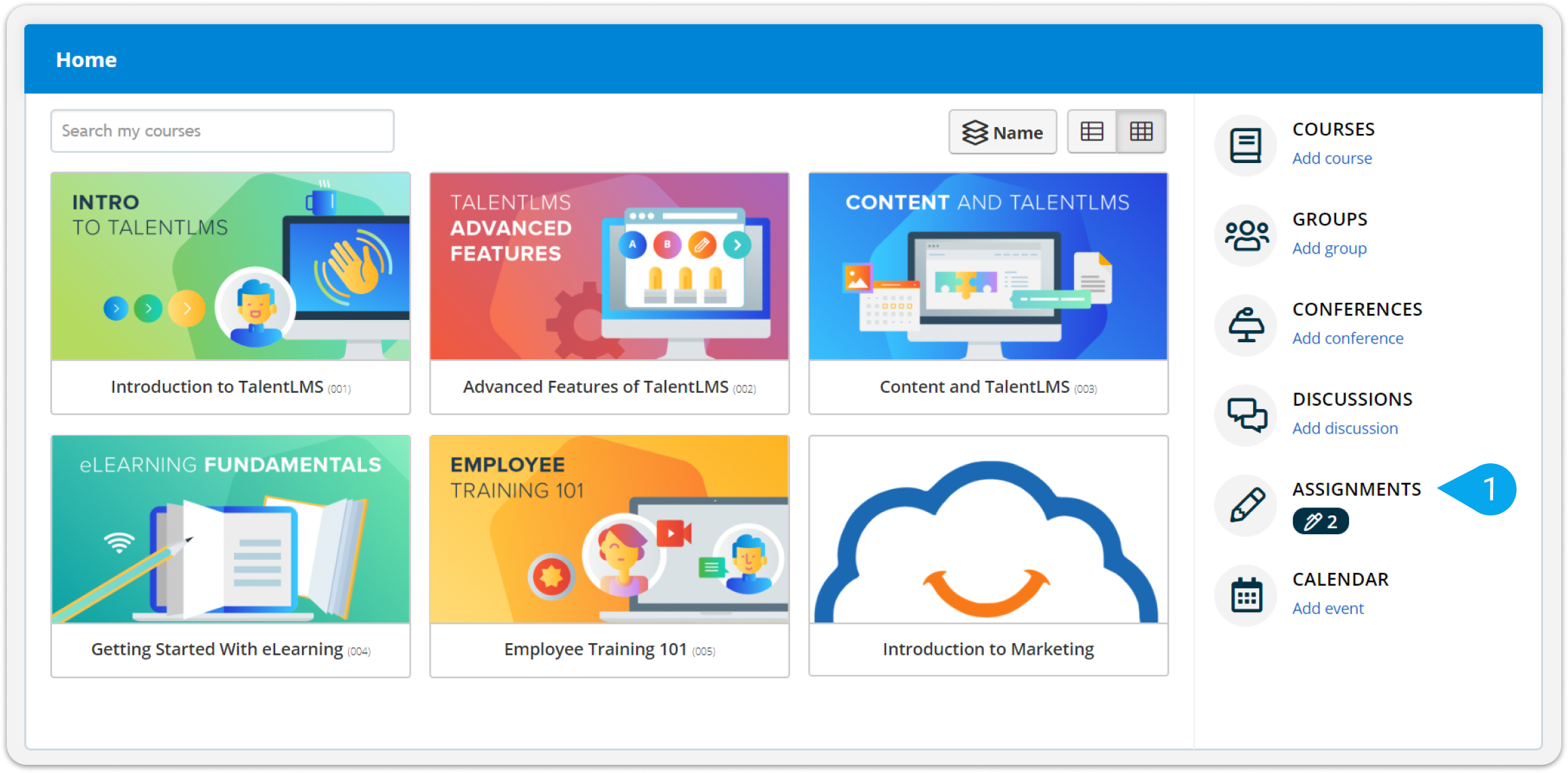
Best for: SMBs needing a lightweight LMS with good UX.
Features
Simple, cloud-based setup
Mobile-friendly learning
Supports SCORM, xAPI
Custom branding
Pros
Easy to deploy and manage
Clean interface
Affordable for small teams
Cons
Limited advanced reporting
Not ideal for large enterprises
Basic customization compared to Moodle
💰 Pricing
Free for up to 5 users
Paid plans start at $69/month for 40 users
⭐ Rating
4.7 / 5 (Capterra)
3. Docebo
Docebo another Moodle alternative, is an AI-powered, enterprise-grade LMS designed for large organizations seeking scalable corporate learning. It features personalized learning paths, multi-language support, social learning tools, and robust integrations with HR and business systems. While highly scalable and feature-rich, it comes with a steeper learning curve and higher cost compared to simpler LMS platforms.
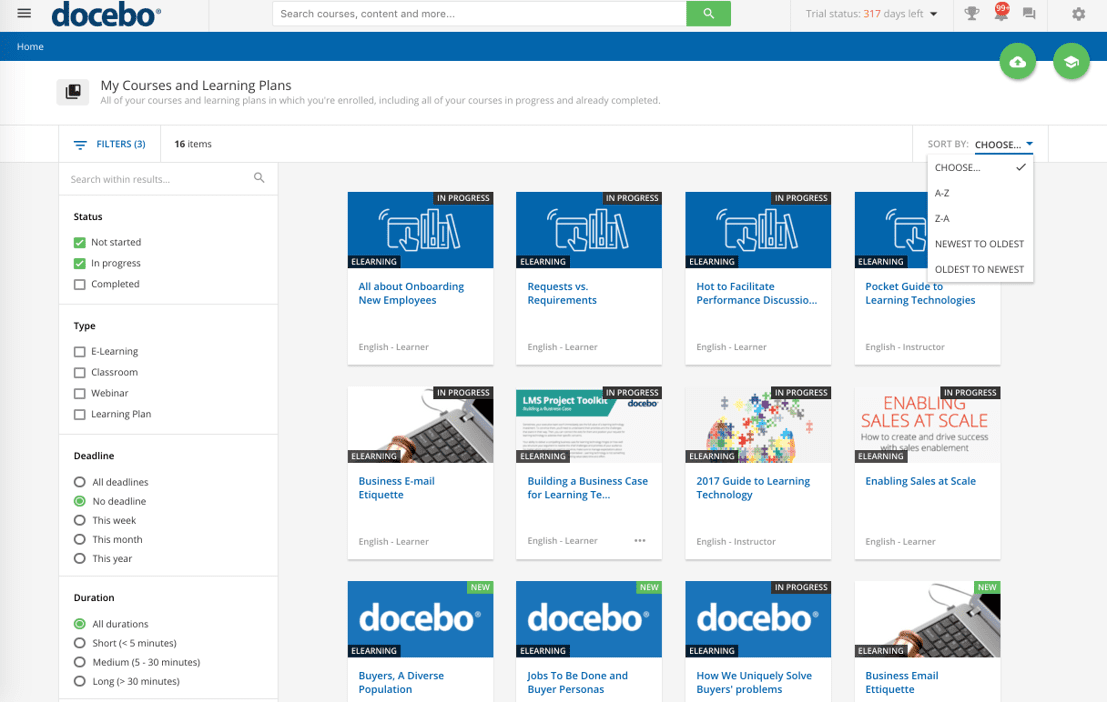
Best for: Enterprises seeking AI-driven corporate learning.
Features
AI-powered recommendations
Multi-language support
Extensive integrations
Social learning features
Pros
Strong enterprise-grade analytics
Robust integrations
Excellent scalability
Cons
Expensive compared to Moodle
Steeper learning curve
💰 Pricing
Custom pricing (usually starts around $25,000/year)
⭐ Rating
4.5 / 5
4. SAP Litmos
SAP Litmos is a cloud-based LMS designed for enterprises with global training needs and could be a good Moodle alternative. It offers compliance-ready templates, gamification, assessments, and SCORM/xAPI support, making it ideal for structured corporate learning. While trusted by large organizations, its user interface can feel dated, and pricing may be high for small to mid-sized businesses.
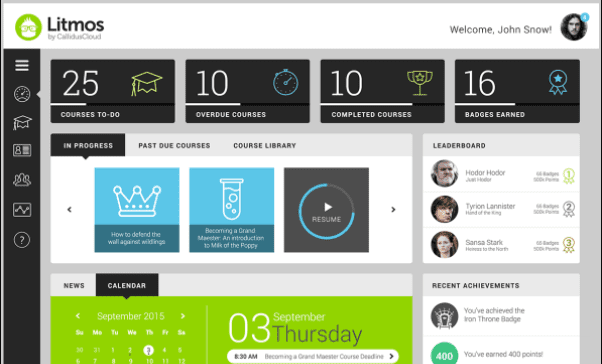
Best for: Enterprises with global training needs.
Features
Cloud-based LMS
Compliance-ready templates
Gamification & assessments
SCORM/xAPI support
Pros
Trusted by large enterprises
Strong compliance tools
Global reach
Cons
UI feels dated
Expensive for SMBs
Limited customization
💰 Pricing
Custom quotes (typically higher-end)
⭐ Rating
4.2 / 5
5. Absorb LMS
Absorb LMS, another Moodle alternative, is a flexible, scalable learning management system suitable for mid-to-large enterprises. It offers AI-driven learning recommendations, robust reporting, eCommerce integration, and SCORM/xAPI support. While it provides a modern and attractive user interface, some users find the admin interface complex, and pricing is higher than simpler LMS platforms.
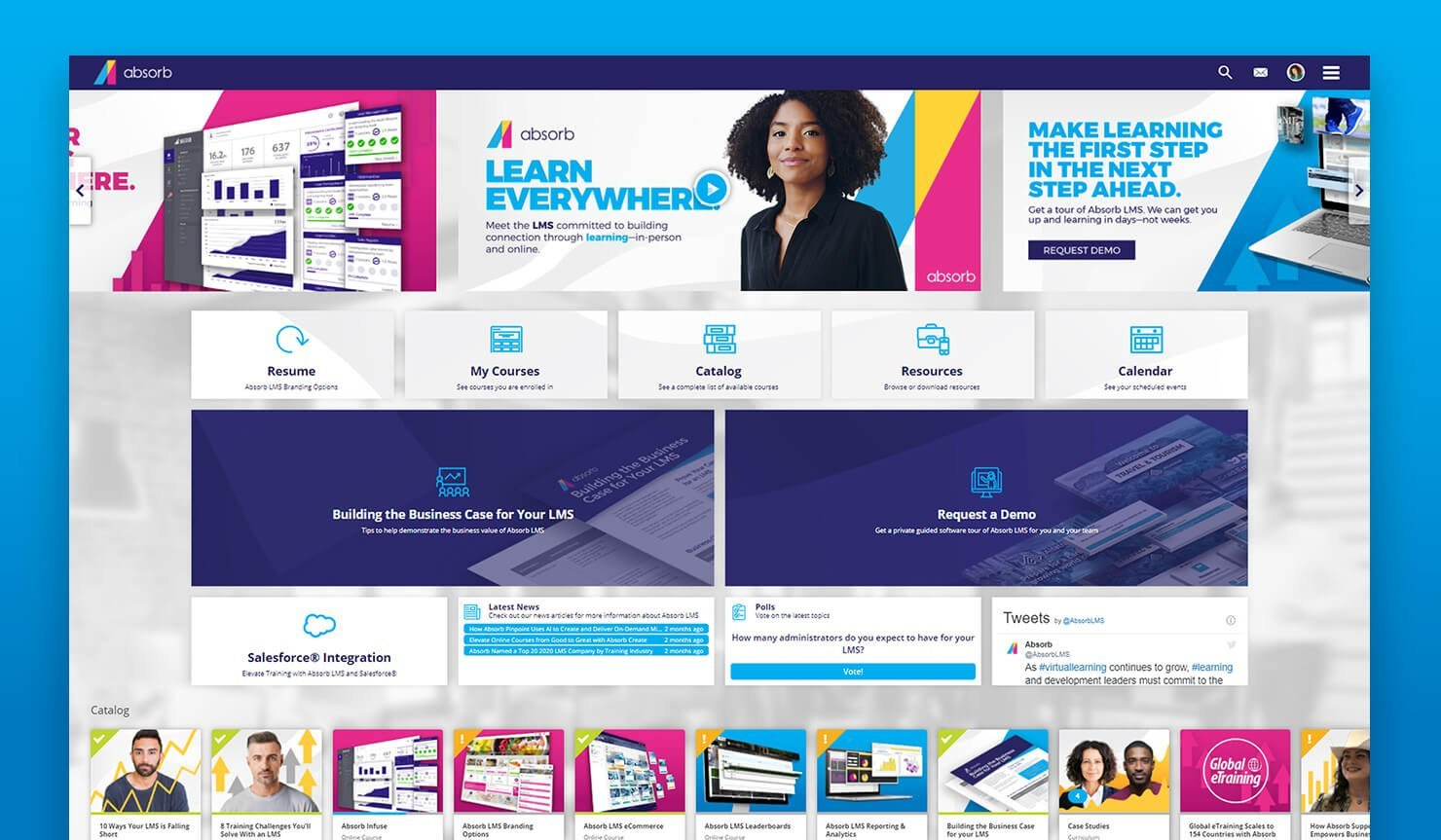
Best for: Mid-to-large enterprises wanting flexibility.
Features
AI-driven recommendations
eCommerce integration
Reporting & analytics
SCORM/xAPI support
Pros
Good scalability
Strong customer support
Attractive UI
Cons
Pricing on the higher side
Some users report admin complexity
💰 Pricing
Custom pricing, usually per active user/month
⭐ Rating
4.5 / 5
6. Cornerstone OnDemand
Cornerstone OnDemand is an all-in-one LMS and talent management platform designed for large enterprises. As a Moodle alternative it offers compliance training, mobile access, deep HR integrations, and robust reporting tools. While ideal for complex workforce learning needs, it has a steeper learning curve, a more complex user interface, and higher pricing compared to simpler LMS alternatives.
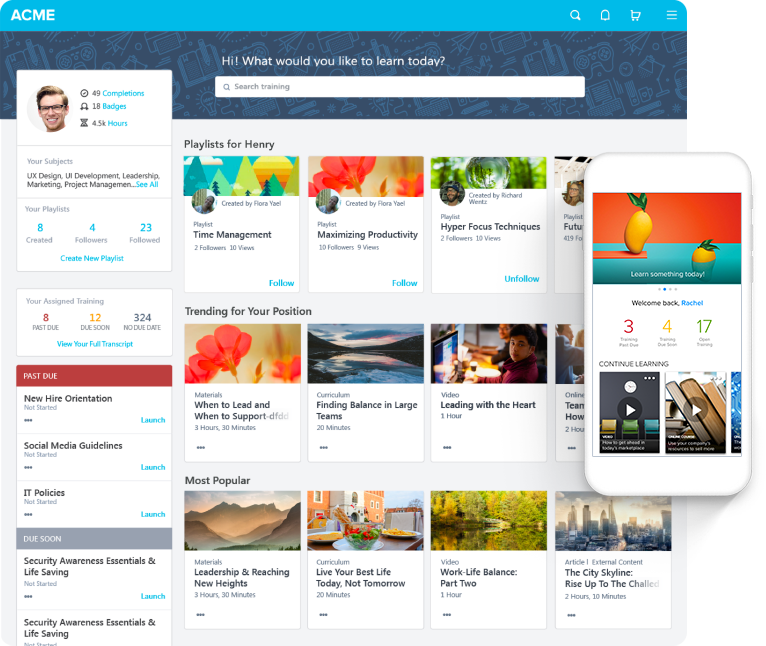
Best for: Enterprises needing HR + Learning suite.
Features
LMS + Talent Management
Compliance training
Mobile access
Deep HR integrations
Pros
All-in-one HR + learning solution
Great for compliance-heavy industries
Widely adopted in enterprise
Cons
Complex UI
Expensive and requires long onboarding
💰 Pricing
Enterprise-level pricing (higher than Moodle)
⭐ Rating
4.3 / 5
7. LearnUpon
LearnUpon, a popular Moodle alternative, is a cloud-based LMS ideal for organizations delivering training to multiple audiences, including employees and customers. It offers multi-tenant capabilities, SCORM/xAPI support, robust reporting, and a mobile-first design. While easy to deploy and use, it has limited customization compared to Moodle and some enterprise-grade LMS platforms.
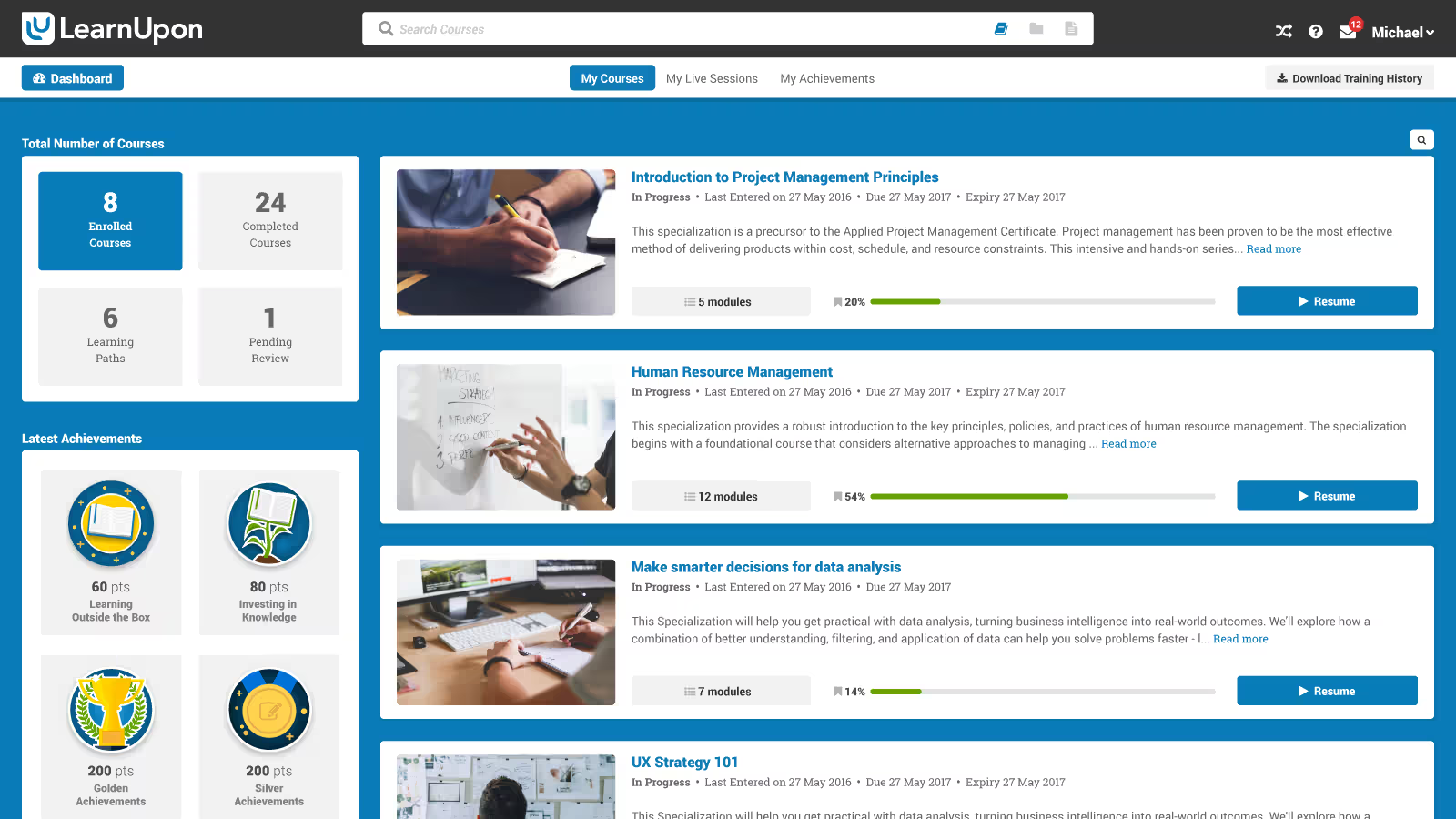
Best for: Organizations with multiple audiences (internal + external training).
Features
Multi-tenant capabilities
SCORM/xAPI support
Good reporting tools
Mobile-first design
Pros
Great for training employees + customers
Clean design
Fast deployment
Cons
Limited customization compared to Moodle
Lacks deep academic features (good for corporate though)
💰 Pricing
Starts around $699/month for 50 users
⭐ Rating
4.6 / 5
Frequently Asked Questions (FAQs)
1. Is Moodle good for corporate training?
Moodle is a powerful open-source LMS, but it was primarily built for educational institutions. While it can be adapted for corporate training, it often requires heavy customization, technical expertise, and plugins. Most companies find it too complex and time-consuming, which is why they explore modern SaaS LMS alternatives like Calibr, TalentLMS, or Docebo.
2. What are the limitations of Moodle for businesses?
Complex setup requiring IT teams
High maintenance (self-hosting, plugin updates)
Not mobile-first compared to modern LMS platforms
Poor user experience for corporate learners
Limited built-in analytics for HR and compliance teams
These limitations make Moodle less attractive for fast-moving organizations that want quick deployment and easy scalability.
3. What is the best alternative to Moodle for corporate training?
For 2025, the best Moodle alternative for workforce training is Calibr. Unlike Moodle, Calibr is designed specifically for corporate learning — offering AI-driven personalization, compliance training modules, HR integrations, and a user-friendly interface. Other strong alternatives include TalentLMS (for SMBs), Docebo (for large enterprises), and LearnUpon (for customer + employee training).
4. How do I migrate from Moodle to Calibr (or another LMS)?
Migrating from Moodle to a modern LMS like Calibr typically involves:
Exporting existing courses (SCORM, videos, documents) from Moodle.
Mapping user data (learners, roles, completion history).
Re-uploading and re-structuring courses in Calibr’s easy drag-and-drop interface.
Testing compliance courses and ensuring analytics tracking.
Rolling out in phases (pilot with one team, then scale).
Calibr provides onboarding support to make migration smooth and painless.
5. Is Moodle free, and are alternatives worth paying for?
Yes, Moodle is free to download and use. However, the hidden costs include:
Hosting and server expenses
Ongoing IT support
Plugin maintenance
Customization development
Alternatives like Calibr, TalentLMS, and Docebo are paid SaaS solutions, but they save businesses time, effort, and maintenance costs — delivering a better ROI in the long run.
6. Which Moodle alternative is best for compliance training?
Calibr is the best alternative for compliance-heavy industries because it comes with:
Pre-built compliance templates
Mandatory video tracking (no skipping)
Certificates & audit-ready reports
Role-based analytics for HR and managers
This makes it more effective than Moodle, where compliance tracking requires complex plugin setup.
7. Can Moodle alternatives integrate with HR systems like ADP or Darwinbox?
Yes. Modern LMS platforms like Calibr offer native integrations with HRMS and workforce platforms (Darwinbox, ADP, Zoho People, etc.). Moodle, by contrast, usually requires custom development or plugins to integrate with HR tools.
Final Thoughts
When it comes to corporate training, Moodle often feels outdated, complex, and IT-heavy. If your organization wants a future-ready LMS that’s scalable, mobile-first, and AI-driven, then exploring Moodle alternatives is the right move.
And if you want an LMS built for the modern workforce, with compliance tools, analytics, and seamless HR integrations — Calibr is the #1 choice.

Sanju has a wealth of experience and expertise in instructional design, bringing innovative ideas and a fresh perspective to e-learning content development. She is passionate about merging technology and creativity for dynamic e-learning. Her passion for creating engaging and effective learning experiences aligns perfectly with Calibr's commitment to excellence. She also enjoys writing about e-learning trends in the corporate world.
